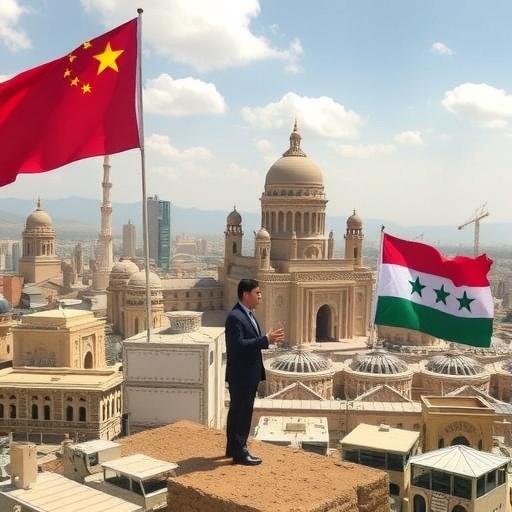In recent years, the geopolitical landscape has undergone significant changes, influencing relationships among global powers. One of the most compelling narratives emerging from this dynamic environment is the evolving relationship between China and Syria. With China’s increasing desire to extend its influence in the Middle East, characterized by ambitious economic initiatives and strategic partnerships, the significance of China’s engagement with Syria becomes paramount. This relationship not only reflects China’s broader foreign policy objectives but also highlights the transformations occurring within the region against a backdrop of shifting alliances and growing competition among world powers.
Historically, Syria’s strategic location has made it a focal point for various international actors. As a country positioned at the crossroads of Asia, Europe, and Africa, Syria’s stability and governance have implications that resonate well beyond its borders. China’s interest in Syria harkens back to the Belt and Road Initiative (BRI), which aims to connect Asia with Africa and Europe through a network of trade routes. By enhancing economic ties with Syria, China seeks to bolster its trade routes while simultaneously gaining a foothold in a country that has been geopolitically significant for centuries.
The increasing significance of China’s investments in Syria cannot be overstated, particularly in the context of reconstruction efforts following a decade-long civil war. As Syria embarks on the slow journey of rebuilding its war-torn infrastructure, Chinese investments present both an opportunity and a strategic maneuver. China is poised to provide not only financial resources but also technology and expertise needed for reconstruction. This assistance can be pivotal for Syria, which has seen its economy decimated and its infrastructure largely destroyed.
The relationship between China and Syria is further buoyed by political alignments and shared interests. Both nations find themselves in opposition to perceived Western hegemony, fostering a partnership characterized by mutual understanding and support. While the West has been critical of the Syrian government, particularly in light of human rights issues, China’s approach has been more diplomatic and pragmatic. By offering support to the Assad regime, China strengthens its position in the region while providing Syria with a powerful ally capable of countering Western pressures.
Moreover, China’s partnership with Syria is not solely limited to political and economic realms; it is increasingly manifesting in a military context as well. China’s discussions about arms sales and military cooperation signify a deepening of ties that could reshape the regional security dynamics. Should this military cooperation materialize, it could embolden the Assad regime and alter the power structures within the Middle East. This development raises questions about the implications for U.S. foreign policy and the broader balance of power in the region.
As global geopolitical transformations continue to unfold, the timing of China’s engagement with Syria is particularly poignant. The shifting sands of international relations denote a possible decline in Western influence, creating space for alternative partnerships. China’s approach is characterized by a non-interventionist stance—an aspect that appeals to many nations wary of Western interventionism. This perspective positions China favorably among countries like Syria that are seeking alliances based on mutual respect and sovereignty.
A critical dimension of the China-Syria relationship is the potential economic benefits for both nations. For China, access to Syria’s market opens pathways for investment opportunities, particularly in sectors like energy, infrastructure, and telecommunications. On the other hand, Syria stands to gain crucial markets and investments that can spur its recovery and development post-conflict. This bilateral economic cooperation exemplifies a strategic partnership driven by pragmatic interests rather than ideological alignment.
However, the relationship is not without its challenges. The path ahead for China in Syria is fraught with risks, including regional instability, the ongoing humanitarian crisis, and potential backlash from other powers who may view this partnership with suspicion. The complexities of navigating the delicate balance of interests, coupled with the unpredictable nature of international politics, will require China to adopt a nuanced approach if it is to successfully cement its presence in Syria.
Moreover, the future of this relationship could be influenced by the changing dynamics of the Middle East itself. Various conflicts and tensions, such as those involving Iran, Turkey, and the Gulf States, will play a crucial role in shaping Syria’s geopolitical landscape. China’s ability to navigate these complex regional dynamics and maintain productive relations with various stakeholders will be essential in ensuring its long-term interests in the region.
The conclusion of this evolving narrative does not yield straightforward answers; rather, it presents a complex interplay of diplomacy, economics, and military strategy. The consequences of the China-Syria relationship will reverberate beyond bilateral ties, affecting broader geopolitical considerations within the Middle East and beyond. Understanding these dynamics will be essential for scholars, policymakers, and analysts seeking to comprehend the increasingly intricate landscape of international relations in a multipolar world.
As the global community watches closely, the future trajectory of China-Syria relations will likely offer critical insights into the transformative shifts occurring in geopolitical alliances. The implications of this partnership may serve as a model for how nations navigate new alliances in a changing world order, pushing traditional boundaries and reshaping the contours of power in the 21st century.
In this evolving narrative, the story of China’s engagement with Syria underscores the complexities inherent in modern diplomacy, illustrating how nations are bound by both necessity and opportunity in their pursuits on the global stage. The long-term impact of these dynamics remains to be seen, yet the significance of this partnership will undoubtedly shape both regional and global affairs in the years to come.
Subject of Research: Dynamics of China-Syria Relations
Article Title: Dynamics of China-Syria relations in the context of global geopolitical transformations
Article References:
Islam, M.T., Iftekharul Islam, A.K.M. Dynamics of China-Syria relations in the context of global geopolitical transformations.
Discov glob soc 3, 133 (2025). https://doi.org/10.1007/s44282-025-00286-2
Image Credits: AI Generated
DOI: https://doi.org/10.1007/s44282-025-00286-2
Keywords: China-Syria relations, geopolitics, Belt and Road Initiative, global transformations, international diplomacy, military cooperation, economic partnerships.




